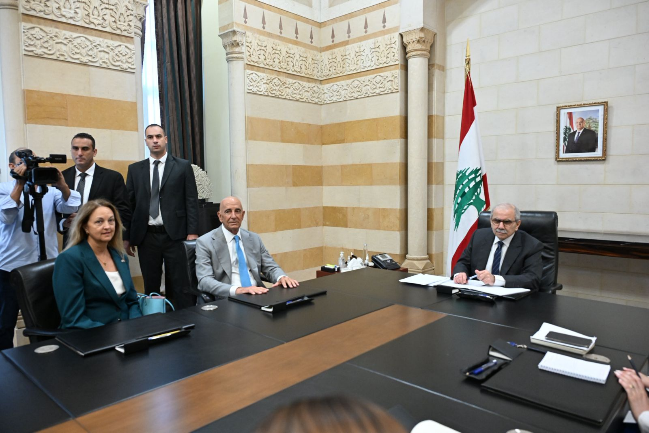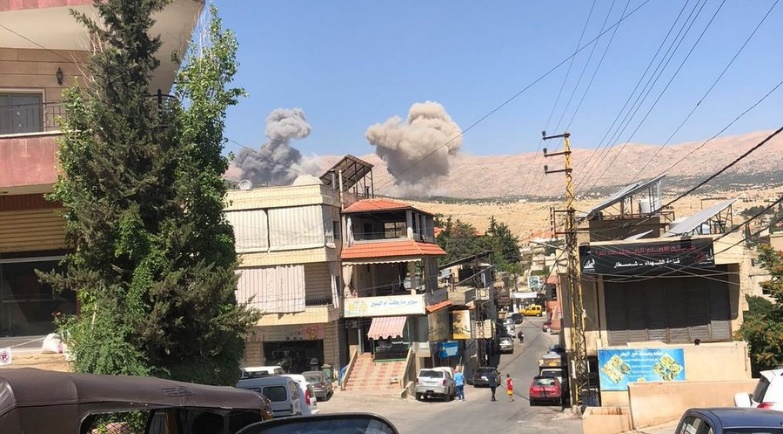 IDF attacks in the Beqa’a Valley (al-Jumhuriya, July 15, 2025).
IDF attacks in the Beqa’a Valley (al-Jumhuriya, July 15, 2025).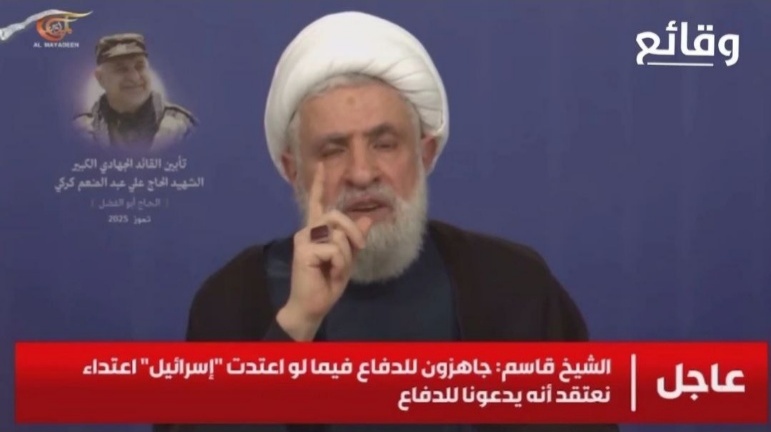 Hezbollah secretary general in a speech commemorating Ali Karaki (al-Mayadeen, July 18, 2025)
Hezbollah secretary general in a speech commemorating Ali Karaki (al-Mayadeen, July 18, 2025)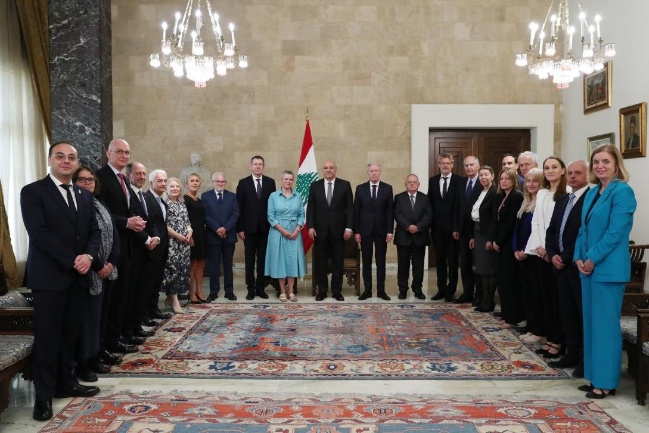 The Lebanese president meets with the EU ambassadors (al-Nahar, July 17, 2025)
The Lebanese president meets with the EU ambassadors (al-Nahar, July 17, 2025)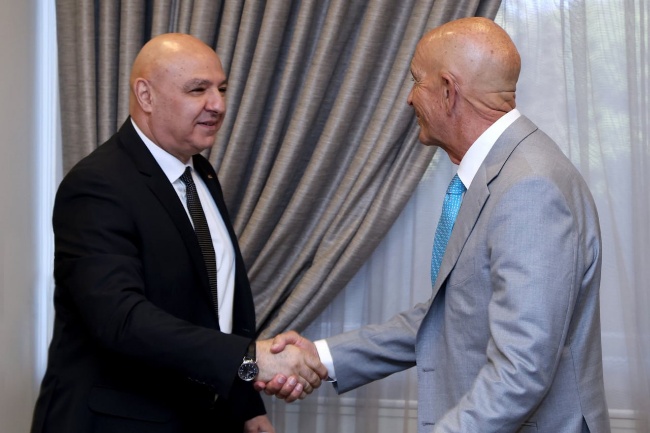 Aoun meets with Barrack (Lebanese presidency X account, July 21, 2025)
Aoun meets with Barrack (Lebanese presidency X account, July 21, 2025)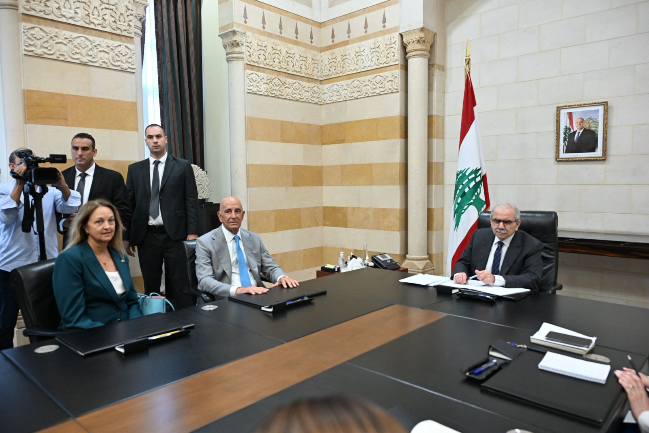 Salam, Barrack and the American ambassador to Lebanon (Lebanon Files, July 21, 2025)
Salam, Barrack and the American ambassador to Lebanon (Lebanon Files, July 21, 2025)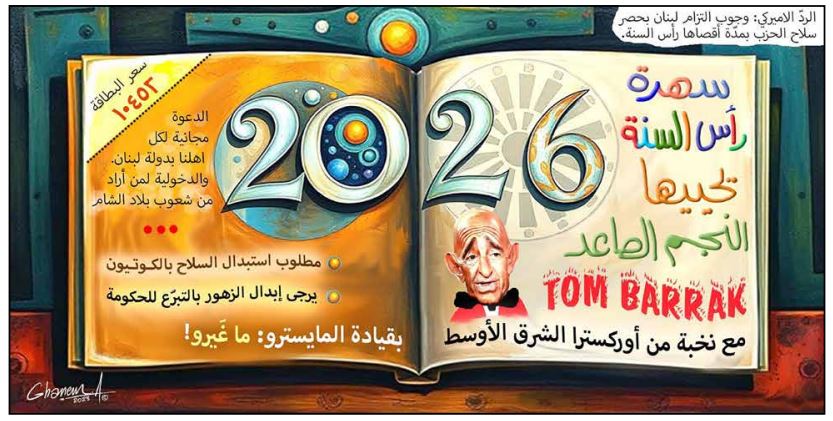 Criticism of American measures for disarmament. According to the United States, Lebanese has to fulfill its commitment to disarm Hezbollah by the first of the new year. The Arabic reads, “New Year’s Eve party starring the popular singer, Tom Barrack, with a select group from the Middle East Orchestra 2026. Free entry for all Lebanese and anyone who wants [to come] from the land of al-Sham” (al-Joumhouria, July 15, 2025)
Criticism of American measures for disarmament. According to the United States, Lebanese has to fulfill its commitment to disarm Hezbollah by the first of the new year. The Arabic reads, “New Year’s Eve party starring the popular singer, Tom Barrack, with a select group from the Middle East Orchestra 2026. Free entry for all Lebanese and anyone who wants [to come] from the land of al-Sham” (al-Joumhouria, July 15, 2025)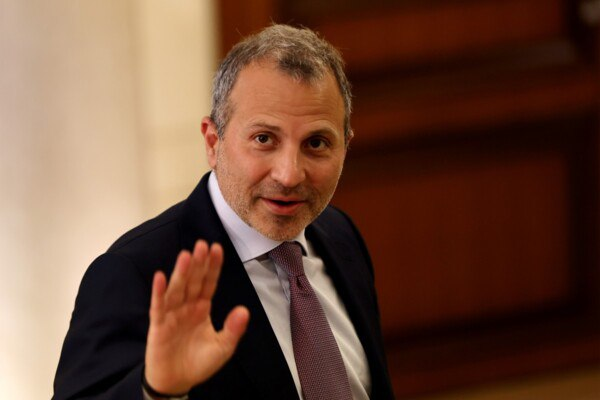 ebran Bassil (al-Nashra, July 15, 2025)
ebran Bassil (al-Nashra, July 15, 2025)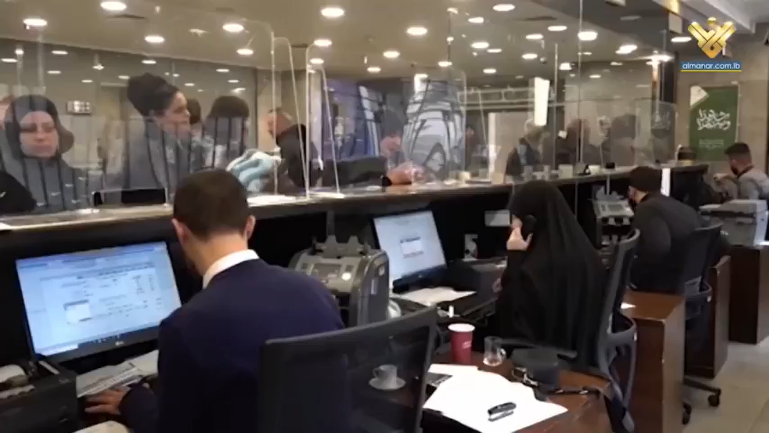 An al-Qard al-Hassan branch (al-Manar, July 19, 2025)
An al-Qard al-Hassan branch (al-Manar, July 19, 2025)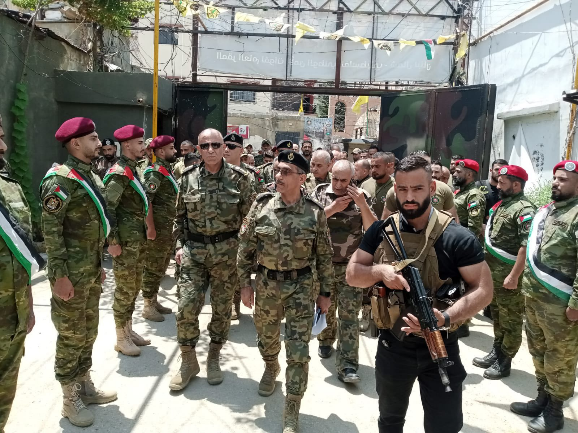 Weapons handover ceremony in Tripoli (Palestinian national security forces Facebook page, July 15, 2025)Overview
Weapons handover ceremony in Tripoli (Palestinian national security forces Facebook page, July 15, 2025)Overview
IDF forces attacked Hezbollah facilities and eliminated operatives as part of continued activity against Hezbollah’s presence in south Lebanon in violation of the ceasefire understandings and against the organization’s efforts to renew its arsenal and military capabilities. Radwan Force facilities in the Beqa’a Valley were attacked and Lebanon claimed that 12 people had been killed.
Na’im Qassem, Hezbollah secretary general, accused the United States of trying to promote a new agreement which ignored the “thousands of violations” Israel had committed since the beginning of the ceasefire. Hezbollah demanded that Lebanese state institutions put an end to the “useless silence” following the “killing” in the Israeli attacks in the Beqa’a Valley.
Thomas Barrack, the American special envoy to Lebanon, met with President Joseph Aoun and was given a new Lebanese response regarding Hezbollah’s disarmament. Barrack said that no progress on the issue would be disappointing, but the United States had no intention of taking punitive measures and only sought to assist and guide. Qassem claimed that relinquishing the weapons would place Lebanon and the “resistance”[1] in existential danger and “allow ISIS to take over the country.”
Iran reportedly successfully transfers weapons to Hezbollah through Iraq and Syria using small vehicles instead of large trucks, and the organization also manufactures its own unmanned aerial vehicles and medium-range missiles.
A new directive from the Bank of Lebanon, Lebanon’s central bank, bans any ties with the al-Qard al-Hassan Association, Hezbollah’s economic wing, due to American sanctions and the Association’s financing of terrorism. Hezbollah condemned the decision, and al-Qard al-Hassan said it was continuing its operations and opening additional branches.
The Palestinian national security forces reported that they had begun handing over the weapons at some of their headquarters in Lebanon in accordance with the directive of Palestinian Authority chairman Mahmoud Abbas. However, a senior operative in one of the armed “factions”[2] in the refugee camps said that it was unrealistic to ask the Palestinians to disarm without guarantees for their security in light of the “complex” regional situation.
The Ceasefire
The IDF
The IDF continued acting against Hezbollah targets in south Lebanon, in violation of the November 27, 2024 ceasefire agreement, which that prohibited the organization’s presence south of the Litani River, and against Hezbollah’s efforts to rearm and restore its military capabilities. This past week, the IDF attacked training camps and weapons depots of Hezbollah’s elite Radwan Force in the northern Beqa’a Valley after identifying attempts to restore the unit’s capabilities. Four Hezbollah operatives were eliminated, including the commander of the Yahmour compound and the Radwan Force naval unit commander (IDF spokesperson, July 14–21, 2025). The Lebanese ministry of health reported 12 fatalities, including seven Syrians, and 12 wounded in attacks in the Wadi Fara area in the Beqa’a Valley and six fatalities in other attacks in south Lebanon (al-Nashra, July 14–21, 2025). According to reports, five of the fatalities in the Beqa’a Valley were Hezbollah operatives (Reuters, July 15, 2025).
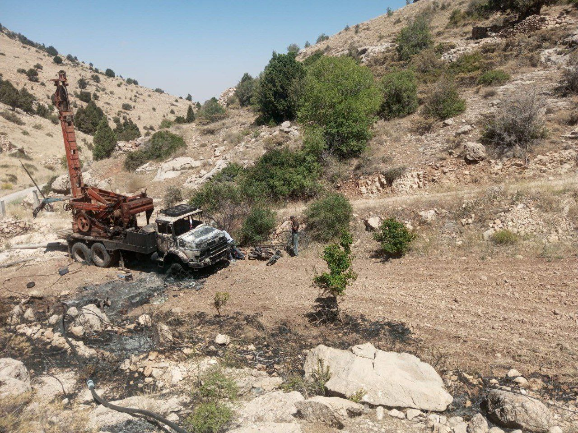

Right: IDF attacks in the Beqa’a Valley (al-Jumhuriya, July 15, 2025).
Left: Attack site in Wadi Fara (al-Manar, July 15, 2025)
Hezbollah
Na’im Qassem, Hezbollah secretary general, claimed Hezbollah had fully implemented the ceasefire agreement in the area south of the Litani River and the Lebanese state had deployed army forces in the areas where it could in south Lebanon, even though Israel had not permitted full deployment in the south. In a speech commemorating Ali Karaki, the former commander of the southern front who was eliminated along with former Hezbollah secretary general Hassan Nasrallah at the end of September 2024, Qassem criticized the United States, which he claimed was proposing a new agreement which ignored Israel’s “3,500 violations” over the past eight months and absolved Israel of responsibility for the entire previous period of “aggression.” He claimed the United States was demanding the disarmament of Hezbollah in exchange for partial Israeli withdrawals at varying times, and according to the new agreement, the only measures to be taken against Israel were condemnation by the UN Security Council and the monitoring of conflict resolution. Qassem said, “Who do you think you’re fooling?” He also accused the American special envoy to Lebanon, Thomas Barrack, of “inciting conflict and threatening Lebanon with annihilation and annexation by regional powers” (al-Manar, July 18, 2025).

Hezbollah secretary general in a speech commemorating Ali Karaki (al-Mayadeen, July 18, 2025)
Hezbollah condemned the [alleged] “deliberate killing committed by the enemy” in the attacks in the northern Beqa’a Valley. The organization stated that the Lebanese state, with all its institutions, had to end its “useless silence” and take serious, decisive action immediately in order to shift responsibility to the international actors. Hezbollah added that the “Zionist enemy” was trying to suppress the “national will” through “blood and fire,” but the Lebanese people were “resilient” and would become stronger and more committed to its national choices, “with resistance[3] as a necessary option to confront the enemy, halt its aggression and preserve Lebanon’s honor and sovereignty” (Hezbollah combat information Telegram channel, July 15, 2025).
Mahmoud Qamati, deputy head of Hezbollah’s political council, said that if Israel were to initiate a renewed attack on Lebanon, the “resistance” had sufficient capabilities and would confront the “enemy” immediately and without hesitation. According to him, Hezbollah was now the “victor,” and Israel was the “loser” (Sada al-Dahiyeh website, July 14, 2025).
The Lebanese Leadership
Lebanese Prime Minister Nawaf Salam said Lebanon would spare no effort in mobilizing Arab and international support to pressure Israel to withdraw from Lebanese territory and to halt its attacks on Lebanese soil. He said they were determined to continue assuming responsibility and noted that the government had been in place “only a few months, not years.” He added that the government was determined to continue expanding the state’s sovereignty over the areas both north and south of the Litani River (al-Nashra, July 16, 2025).
The ambassadors to Lebanon of EU countries held a round of meetings with the heads of state. Nabih Berri, speaker of the Lebanese Parliament, reportedly related to the developments in Lebanon and the region in light of “Israel’s failure to comply with UN Resolution 1701 and the ceasefire.” After meeting with President Aoun and Prime Minister Salam, the EU ambassadors issued a statement regarding the allocation of new funding to resolve the consequences of the conflict on the country’s security and stability, by supporting the Lebanese army and its deployment in the south, rubble removal and strengthening of border security. The ambassadors emphasized the crucial role of UNIFIL in maintaining the stability and security of south Lebanon (al-Nahar, July 17, 2025).

The Lebanese president meets with the EU ambassadors (al-Nahar, July 17, 2025)
The Lebanese Army
The Lebanese army stated that the country was currently facing exceptional circumstances, primarily “attacks and violations of its sovereignty by the Israeli enemy,” alongside challenges in maintaining internal security and border surveillance, and “complex regional developments.” The army said it would not allow any violation of security or civil peace, calling for the unity and solidarity of the Lebanese people to overcome the current situation and to reject any action that might harm Lebanon’s security (Lebanese army X account, July 18, 2025).
The Lebanese army claimed that its forces, together with UNIFIL, had pushed back Israeli engineering and military equipment which was allegedly carrying out excavation work in the Bint Jbeil–Rmeish area in south Lebanon. The army called the IDF Israeli operations a “disgraceful violation” of Resolution 1701, adding that it continued to monitor developments on the border in coordination with UNIFIL (al-Nashra, July 20, 2025).
Disarming Hezbollah
On July 21, 2025, Thomas Barrack, the American special envoy to Lebanon and Syria, met in Beirut with Lebanese President Joseph Aoun, at the start of a round of meetings with senior state officials, including Prime Minister Nawaf Salam, Nabih Berri, speaker of the Lebanese Parliament, Rodolf Haykal, commander of the Lebanese army, members of parliament, and religious leaders. According to reports, they discussed developments in Lebanon, especially the implementation of the ceasefire in south Lebanon and Hezbollah’s disarmament, and regional developments, particularly the clashes in the Druze areas of Syria (Lebanese media, July 21, 2025).

Aoun meets with Barrack (Lebanese presidency X account, July 21, 2025)
During the meeting with Barrack, President Aoun reportedly gave him a document regarding Lebanon’s implementation of its commitments since the start of the ceasefire with Israel at the end of November 2024. The document included references to the Lebanese government’s declaration at its formation in February 2025 and to President Aoun’s inaugural speech in January 2025 (Lebanese presidency X account, July 21, 2025).
Following the meeting with Prime Minister Salam, Barrack said the issue of Hezbollah’s disarmament was an internal Lebanese matter and they were merely trying to assist, guide and mediate between the sides, not to impose anything on any party, including Israel. However, he emphasized that Hezbollah was designated a terrorist organization by the United States, and therefore he had no dealings with it, only with the Lebanese government. He also refrained from giving specific timelines for disarmament and said lack of progress would be disappointing, but there would be no consequences, and they had no intention of imposing sanctions on Lebanese individuals. Regarding the situation in south Lebanon, he acknowledged that the ceasefire agreement had not achieved its objective and said they were trying to address the causes. He said he had brought forward his visit to Lebanon because the American president wanted to achieve regional stability and Lebanon played a key role in achieving the goal (al-Nashra, July 21, 2025).

Salam, Barrack and the American ambassador to Lebanon (Lebanon Files, July 21, 2025)
In preparation for the Aoun-Barrack meeting, “well-informed sources” said that Lebanon’s comments on the United States response had been finished after the initial response to Barrack’s propositions had been submitted on July 7, 2025. Reportedly, the new Lebanese document includes a limited timeline for the implementation of each stage (Lebanon Files, July 21, 2025). Earlier, an “official Lebanese source” stated that the American response was “positive in form, but strict in content.” According to the source, the Americans want Lebanon to specify a timetable to begin collecting illegal weapons and whose deadline would be the end of the current year. The source reported that Lebanon would ask the Americans for guarantees in exchange for the collection of all illegal weapons in Lebanon, including compelling Israel to withdraw from the five outposts it seized in south Lebanon, demarcating the Israel-Lebanon border, the release of Lebanese citizens held by Israel, a timetable for rebuilding the areas destroyed in the war, an end to Israeli attacks by land, sea and air, and to stop the targeted killings (al-Sharq al-Awsat, July 15 and 20, 2025).
In another report, “sources” noted that the American response was not a new agreement between Lebanon and Israel but rather a mechanism for implementing the agreement signed in November 2024, consisting of coordinated and sequential stages of weapons handover alongside Israeli withdrawal. The “sources” claimed no response was required from Hezbollah because it had already agreed to the government’s statement affirming the state monopoly of arms. The “sources” added that the Lebanese response included a timeline for each stage of disarmament, but no specific start or end dates had been given since clarifications were still needed from the American State Department and not just from Barrack himself (al-Jadeed, July 20, 2025).
“Well-informed sources” reported that an American military delegation would visit Beirut in the near future and meet with senior Lebanese army officers to present a new and stricter roadmap for the implementation of UN Security Council Resolution 1701 and the ceasefire agreement in the areas both south and north of the Litani River. The “sources” said the updated roadmap would include a demand that the Lebanese army document every stage of dismantling military facilities and receiving weapons according to transparent criteria which would allow international forces to verify and supervise the process. They added that officers from the Lebanese army in the area south of the Litani River had refused the Israeli-American request to blow up Hezbollah’s military facilities rather than dismantling them and confiscating the weapons. According to the report, the American document set a short timeline of several months for the handover of Hezbollah’s weapons under international supervision, which is considered a direct threat to Israel’s security. The “sources” said the most important point for the Americans was an explicit public declaration by Hezbollah that it agreed to hand over its weapons under the framework of the “national strategy” program (al-Akhbar, July 16, 2025).
The Lebanese leadership continued to claim it was committed to implementing the vision of a state monopoly on weapons and reiterated that any decision about war and peace rested solely with the state institutions:
President of Lebanon Joseph Aoun said Lebanon’s territorial integrity was a national principle anchored in the constitution and protected by the Lebanese army. He said that after being elected president in January 2025 he had sworn to preserve the country’s independence and territorial integrity, and “anyone who thinks someone who has sworn twice to defend the unity of the state [when elected army commander and president] would break that oath or accept similar proposals is mistaken.” Aoun added that the decision regarding the monopoly on arms by the state had been based on the Taif Agreement, along with the decision that war and peace rested with the state, the basic components of any country (al-Nashra, July 14, 2025).
Lebanese Prime Minister Nawaf Salam claimed that south Lebanon would not have been “liberated” in 2000 without Hezbollah’s weapons, but added that once that had happened, the opportunity to concentrate the weapons in the hands of the state and arm the Lebanese army was missed. He said Barrack’s concept paper included a close, gradual linkage between the two processes [the concentration of weapons under the state’s control and the withdrawal of IDF forces from south Lebanon], but he added that the document needed improvement. When asked what would happen if Hezbollah refused to hand over its weapons, Salam said he did not think the organization would do that, as most Lebanese wanted weapons to be solely in the hands of the state and for the state alone to decide on war and peace, without another partner (al-Jadeed, July 18, 2025).
Hezbollah secretary general Na’im Qassem remained defiant regarding the possibility of disarming the organization, threatening that disarmament could lead to civil war. He claimed that if a decision were made to take Hezbollah’s weapons, it would not be long before ISIS attacked Lebanon from east to west in unprecedented assaults, calling it a great existential threat to Lebanon and to the “resistance.” He claimed Lebanon currently faced three dangers, which were a threat from Israel on the southern border, a threat from ISIS from the east and a threat from “American tyranny” which was trying to “dominate” Lebanon, and only after all three had been removed would Hezbollah agree to discuss a strategy of defense. He added that the “pretext” of Israeli security meant no one could reject Israel’s demands and claimed that the demand for disarmament was a step toward “Israeli regional expansion.” He said Hezbollah would not surrender and he and the popular base supporting him were prepared for confrontation, and as long as they lived Israel would not achieve its goals (al-Manar, July 18, 2025). In response to Qassem’s threats of civil war, the prime minister warned against using scare tactics about a war that no one wanted (al-Jadeed, July 18, 2025).
![Criticism of American measures for disarmament. According to the United States, Lebanese has to fulfill its commitment to disarm Hezbollah by the first of the new year. The Arabic reads, "New Year's Eve party starring the popular singer, Tom Barrack, with a select group from the Middle East Orchestra 2026. Free entry for all Lebanese and anyone who wants [to come] from the land of al-Sham" (al-Joumhouria, July 15, 2025)](https://www.newsbeep.com/wp-content/uploads/2025/07/word-image-1753172877571.jpeg)
Criticism of American measures for disarmament. According to the United States, Lebanese has to fulfill its commitment to disarm Hezbollah by the first of the new year. The Arabic reads, “New Year’s Eve party starring the popular singer, Tom Barrack, with a select group from the Middle East Orchestra 2026. Free entry for all Lebanese and anyone who wants [to come] from the land of al-Sham”[4] (al-Joumhouria, July 15, 2025)
“Sources close to Hezbollah” said that Israel’s continued daily attacks on Lebanon and the killing of the organization’s operatives were making Hezbollah cling more tightly to its weapons. According to the “sources,” the clashes and killing in the Druze areas of Syria and Hezbollah’s fear that similar acts would be directed against the Shi’ites made it difficult to demand Hezbollah’s disarmament, while the organization claimed that the weapons were needed to defend “our land, ourselves, and our existence” (al-Joumhouria, July 19, 2025). Hezbollah’s position regarding its “defensive weapons” sparked reactions in Lebanon’s public sphere:
Gebran Bassil, leader of the Free Patriotic Movement, said they waned Hezbollah to hand over its weapons, but were not planning incitement. He said Hezbollah had to relinquish its weapons on its own, and he opposed anyone else’s disarming it. Bassil added, “When a Lebanese MP says he has 15,000 fighters to confront Hezbollah and another threatens that the current Syrian regime will disarm the organization, they give Hezbollah an excuse to say that it is protecting Lebanon, not only from Israel but also from terrorism” (al-Nashra, July 15, 2025).

Gebran Bassil (al-Nashra, July 15, 2025)
General Ashraf Rifi, former commander of Lebanon’s internal security forces and minister of justice, rejected Hezbollah’s claims that the weapons in its possession were for defense. He said the weapons did not protect Hezbollah’s leadership or its operatives, and the concept of the “resistance weapons” had collapsed, and warned that Lebanon would not be stabile as long as there were illegal weapons outside the framework of the state (Here Is Lebanon website, July 18, 2025).
Meanwhile, according to reports, Iran transferred weapons to Hezbollah through Iraq and Syria. “Sources” said that Iran had recently begun using small vehicles to smuggle weapons to Hezbollah in Lebanon through Syrian territory, after previously relying on large trucks. Reportedly, Hezbollah smuggled Kornet anti-tank missiles and advanced weapons into Lebanon, and was also independently producing UAVs and medium-range missiles (Wall Street Journal, July 17, 2025).
Hezbollah
The Bank of Lebanon vs. the al-Qard al-Hassan Association
The Bank of Lebanon, the country’s central bank, issued a directive prohibiting any ties with financial institutions operating without a license from the bank itself, including the al-Qard al-Hassan Association, Hezbollah’s economic wing.[5] Bank of Lebanon Directive No. 13735 states that in accordance with money laundering and counterterrorism financing laws and other regulations, and pursuant to the Financial Action Task Force (FATF) action plan to address Lebanon’s unregulated financial sector, it is prohibited to maintain ties with unlicensed entities which are subject to international sanctions and linked to suspicious activity due to potential exposure to crimes of money laundering and the financing of terrorism. The directive includes a ban on financial, commercial and other ties, direct or indirect, with unlicensed associations, currency exchange institutions and money transfer companies. Besides the al-Qard al-Hassan Association, the list includes Tasheelat Ltd., al-Issar Finance and Investment Company, Beit al-Mal for Muslims and other entities, institutions, and organizations appearing on international sanctions lists. The Bank warned that violators of the directive would be subject to legal action and measures such as suspension or revocation of licenses, freezing of accounts and assets, and referral to the Special Investigation Commission (al-Akhbar, July 15, 2025). It was later reported that the Bank’s decision was a first step, to be followed by additional actions, including the closure of the Association’s branches across Lebanon. It was also reported that Lebanese authorities would continue to shut down all commercial entities found to be connected to Hezbollah in accordance with American demands (al-Arabiya, July 17, 2025).
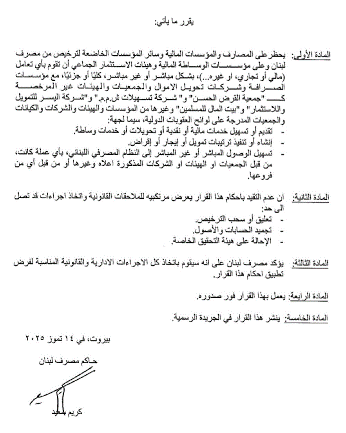
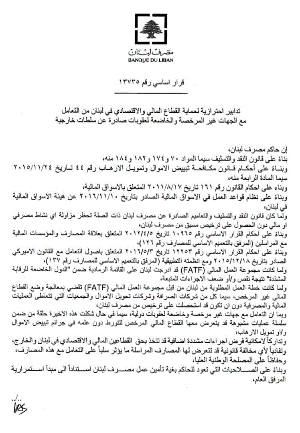
The Bank directive (al-Akhbar, July 15, 2025)
In response to the Bank’s decision, Thomas Barrack, the American special envoy to Lebanon, said it was “a step in the right direction by the Lebanese government” (Thomas Barrack’s X account, July 15, 2025).
Hezbollah’s parliamentary bloc stated it considered the actions against al-Qard al-Hassan a direct blow to the interests of Lebanese society and an exploitation of the Bank as a tool for implementing foreign policy and dictates against Lebanon’s national interests. The bloc said the measures were a dangerous attempt to undermine social stability and claimed the Association was “a nonprofit charity institution” serving Lebanese citizens, and would continue its operations (al-‘Ahed, July 17, 2025).
In defiance of the Bank’s decision, the al-Qard al-Hassan Association announced the opening of four new branches in Lebanon. The Association’s director, Adel Mansour, said the number of branches had increased from 36 to 40 after the fighting against Israel and they employed dozens of workers. He claimed the Association’s financial situation was now stronger than before the fighting, and they issued loans totaling tens of millions of Lebanese pounds each month. He added that they would continue to fulfill their social and financial duties faster and more efficiently despite the pressure and measures taken against them (al-Manar, July 19, 2025).

An al-Qard al-Hassan branch (al-Manar, July 19, 2025)
Penetration of Hezbollah Intelligence
Mahmoud Qamati, deputy head of Hezbollah’s Political Council, claimed that no spies had been discovered within the organization and that the investigation had not yet yielded any results, although in his estimation there were agents. According to Qamati, the organization reverted to older techniques at the expense of advanced technology and also identified the breach that had given “the enemy” access, which is why Israel had lost the ability to carry out killings based on accurate intelligence (Sada al-Dahiyeh website, July 14, 2025).
The Reconstruction of South Lebanon
Mahmoud Qamati said that Iran supported housing for displaced residents and the renovation of buildings and had succeeded in transferring money sufficient for at least one year. He said the country had to beware of a major internal crisis which could be caused by the reconstruction issue, since the government delayed the arrival of Iranian aid and refused to accept it on the grounds that there was aid from alternative sources. Qamati emphasized that reconstruction was important and that they did not intend to give it up (Sada al-Dahiyeh website, July 14, 2025).
Condemnation of IDF Strikes in Syria
Amid Israeli attacks on targets in Syria in support of the Druze due to the violent clashes in al-Suwayda, Hezbollah secretary general Na’im Qassem accused Israel of destroying Syria’s military capabilities, occupying 600 square kilometers in the Golan Heights and Quneitra, and attacking under the “pretext” of protecting the Druze. He claimed Israel was demanding the disarmament of Syria and wanted Syria to be “under Israeli rule.” He called Israel a “cancer” and warned that normalization with it was intended to promote the annexation of the region to Israel, and asked, “Can we accept that in Lebanon? Have we not seen what is happening in the Gaza Strip? Palestinians are being killed under direct American supervision” (al-Manar, July 18, 2025).
Hezbollah condemned the “Zionist aggression” in Syria, which it claimed was a “blatant violation” of Syria’s sovereignty and international law. According to Hezbollah, experience has shown that “the enemy” does not respect alliances or abide by agreements and understands only the language of force (Hezbollah combat information Telegram channel, July 16, 2025).
The Palestinians in Lebanon
The Palestinian national security forces announced that the committee established by order of Palestinian Authority (PA) chairman Mahmoud Abbas to disarm the Palestinian refugee camps in Lebanon had begun implementing his directive with steps to collect and hand over weapons in areas where the national security forces were deployed, at the Beirut and Burj al-Barajneh headquarters. Similar steps were taken later at the Tripoli regional headquarters. The committee emphasized its full commitment to carrying out the tasks assigned to it. It was noted that the move was carried out as part of the commitment to improving stability and organizing the Palestinian security presence in a way that served the interests of the Palestinian people in the refugee camps and Palestinian gathering areas in Lebanon, in accordance with national policy and the directives of the Palestinian leadership (Palestinian national security forces Facebook page, July 14–15, 2025).

Weapons handover ceremony in Tripoli
(Palestinian national security forces Facebook page, July 15, 2025)
Al-Abed Ibrahim Khalil, the commander of the national security forces, visited the Ain al-Hilweh refugee camp in Lebanon to monitor the security situation and the implementation of Mahmoud Abbas’ directives. He also met with the leadership of the national security forces in Sidon and discussed increasing stability in the refugee camp, stating that maintaining security in the refugee camps in Lebanon was part of the Palestinian leadership’s responsibility (Palestinian national security forces Facebook page, July 15, 2025).
Despite the start of the disarmament process, a “senior Palestinian official in a major ‘faction’ within the Palestinian refugee camps” claimed that disarmament was not an option at this time and warned that any insistence on forcibly disarming them would lead to an “explosion” in the camps. He added that a decision to hand over weapons would not pass without first holding an internal Palestinian dialogue, followed by a Palestinian-Lebanese dialogue. According to him, Mahmoud Abbas had embarrassed Lebanese President Joseph Aoun by hastily setting a date to begin the disarmament process without discussion, which was why the event ended without meeting the deadline for disarmament in the Beirut refugee camps on June 16, 2025. The official added that Abbas’ stance also caused upheaval within Fatah, as reflected in sudden changes in several positions, including the removal of ambassador to Lebanon Ashraf Dabbour. He noted that there were people in Fatah whose opinion was that the movement should not unilaterally disarm, as doing so would strengthen other “factions” and extremist Islamist groups in the camps at the expense of Fatah’s role and influence. He further stated that given the complex regional and Lebanese situations, it was unrealistic to ask the Palestinians to surrender their weapons arbitrarily without providing them with guarantees regarding their security and rights (al-Jumhuriya, July 18, 2025).
Meanwhile, “sources close to the Palestinians” noted that the Lebanese state did not have a clear and systematic disarmament plan and that nothing had been done except issue a general statement about disarmament, so the matter was expected to remain at an impasse. The sources said that what was required from the Lebanese was a clear plan for dealing with the weapons held by Fatah and other “organizations” in the refugee camps, including Hamas, the Palestinian Islamic Jihad (PIJ) and the groups that support them (Sawt Beirut International, July 19, 2025).
[1] Hezbollah and the Palestinian terrorist organizations operating in Lebanon.
[2] Terrorist organizations.
[3] Violence and terrorism.
[4] The Levant.
[5] For further information, see the May 2019 ITIC report, Hezbollah’s socioeconomic foundations: Al-Qard al-Hasan, a quasi-bank that provides interest-free loans, mainly to members of the Shiite community.
Related Articles

